The Core i7 980X Review: Intel's First 6-Core Desktop CPU
by Anand Lal Shimpi on March 11, 2010 12:00 AM EST- Posted in
- CPUs
Windows 7 Application Performance
We're testing out a few new additions to our Bench database, so what we've got here are some updated application tests run under Windows 7. The CPUs compared are going to be different since we don't have as much historical data, but we'll be building it up over the coming months.
x264 HD Encoding Performance
It's what you've all been asking for - our x264 encoding test with an updated version of x264. In this case we're using TechARP's x264-HD 3.03 bench and x264 version 1342.
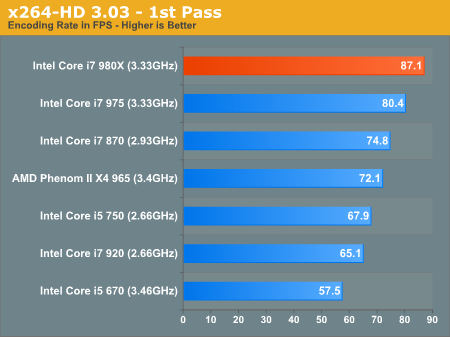
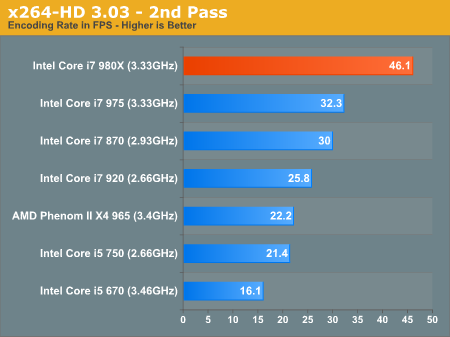
7-zip Benchmark & Performance
We use WinRAR for our compression test under Vista, but more and more users are switching to 7-zip. The performance is more CPU dependent so we're going to look at it. First up is the built in 7-zip benchmark:
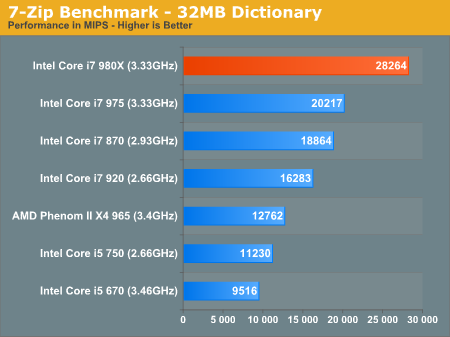
Here we're taking the same 300MB set of images from our WinRAR test and are compressing them using 7-zip. We divide file size by completion time to get compression speed in KB/s:
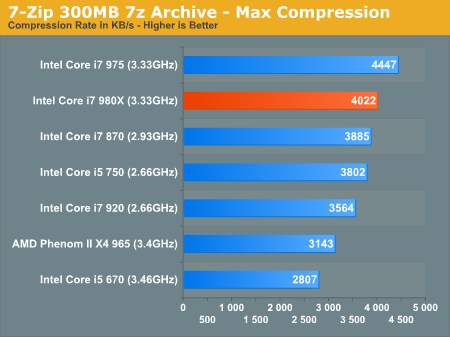
The actual 7-zip archive creation process is limited to two threads, and here the 980X actually falls behind the 975 presumably because of its higher latency L3 cache. The built in 7-zip benchmark can run across all 12 threads and thus performs much better on the 980X, serving more as a bandwidth benchmark than anything else.
Sonar 8 Multi-track Audio Export
We've had some requests for digital audio workstation benchmarks so we're adding a multi-track audio export from Sonar 8. Performance is expressed in KB/s:
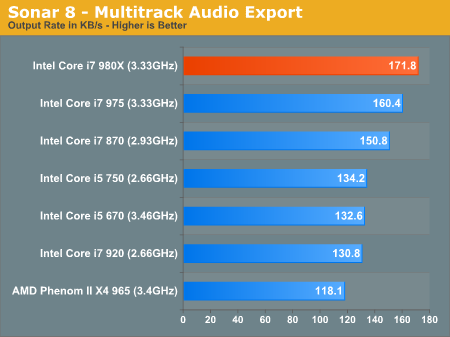
Again, we see a small gain here thanks to the larger cache but the extra cores aren't doing much.










102 Comments
View All Comments
softdrinkviking - Thursday, March 11, 2010 - link
it's a 2-p4 mcm at at a lower node with a lotof improvements over the older p4 manufacturing processes.
if i absolutely had to have netburst, that's what i would want.
i think it's really nice that Anand includes it in the comparison, because it gives a sense of history to the article, and it shows how much faster CPUs have gotten in such a short time.
JonnyDough - Thursday, March 11, 2010 - link
Yep. It might be based on P4, but you can't really considered a P4. It was based on two cedar mill cores rather than smithfield with double the cache and a 200mhz bus speed jump.Dadofamunky - Thursday, March 11, 2010 - link
And exactly the same NetBurst architecture otherwise. And I'm sorry, but seeing that POS coming up with 40% against Gulftown signifies either one of two things: Gulftown isn't that much faster; or, the SysMark software distorts the relative performance results. That isn't a realistic portrayal of 'history.' SysMark 2007 badly needs an update. It isn't a realistic tool for the 4-to-6-core world.danielkza - Thursday, March 11, 2010 - link
Weird, other sites managed to squeeze up to 4.4GHz of the 980X on air, and 4.7GHz on WC. I thought initially of different stability requirements from both parts, but bit-tech ran all their benchmarks at both 4400MHz and 4720MHz. Maybe Anand's DX58 isn't holding up so well after all.http://www.bit-tech.net/hardware/cpus/2010/03/11/i...">http://www.bit-tech.net/hardware/cpus/2...-core-i7...
DanNeely - Thursday, March 11, 2010 - link
Anand only used a stock cooler to test. The intel coolers never have much head room in them. Luck of the draw in both mobo and CPU might be a factor but so is bit-tech's better cooling.chrisfam - Thursday, March 11, 2010 - link
Tomshardware got a 4.13 Ghz overclock with 1.4v and with Enhanced SpeedStep and Turbo Boost enabled. Neoseeker got a 4.16 Ghz overclock with just 1.35v. And both of these were with the stock heat sink.Anand Lal Shimpi - Thursday, March 11, 2010 - link
I've been working on a follow up to go deeper into our overclocked numbers. A motherboard swap later and a little bit of work appears to be paying off...I'm over 4.1GHz already :-)Update soon!
Take care,
Anand
chrisfam - Thursday, March 11, 2010 - link
Updated overclock (4.13 Ghz, 1.359V) is much better. Thanks for the update.Rajinder Gill - Thursday, March 11, 2010 - link
That's right, 3.7-3.8GHz is the full load limit of Intel's stock cooler with these beasts. We ran out of time to really push, but I'm sure we'll find out what these chips can do in due course.regards
Raja
strikeback03 - Thursday, March 11, 2010 - link
Is the new tower cooler an improvement in any way over the old one? Is it quieter, as it doesn't seem to offer more OC headroom.Also, how does the CPU power consumption increase by 130W at load over idle, while system consumption only goes up 90W?